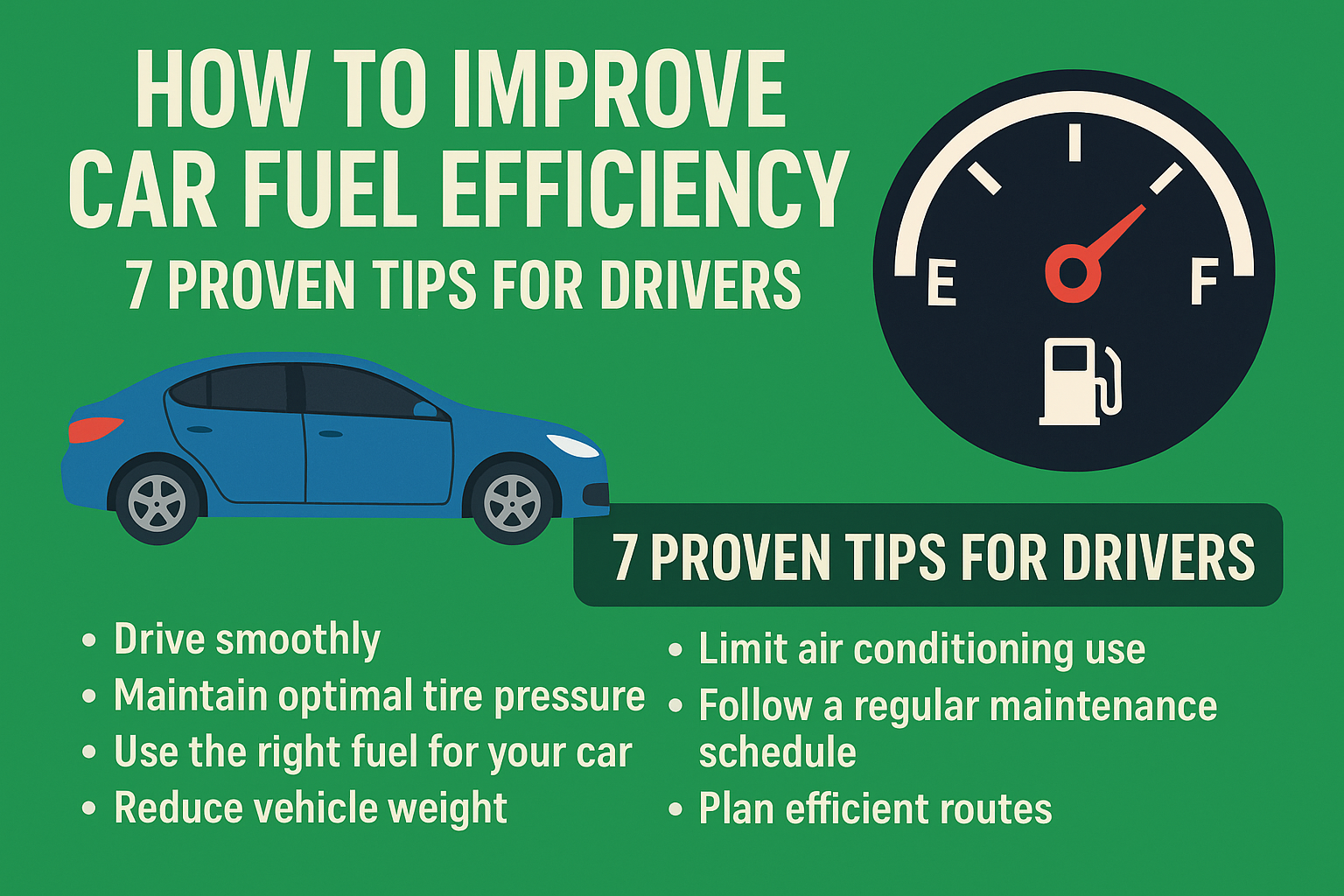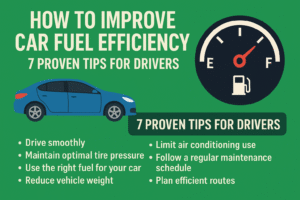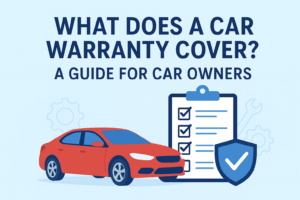With fuel prices climbing globally, improving car fuel efficiency is a top priority for drivers looking to save money on fuel. Whether you’re commuting daily or embarking on long road trips, small changes in driving habits and maintenance can significantly reduce fuel consumption. Studies show that optimizing fuel efficiency can save drivers up to 20% on fuel costs annually, translating to hundreds or thousands in savings. This comprehensive guide shares 7 proven tips to improve car fuel efficiency, from smart driving techniques to practical maintenance hacks, tailored for drivers worldwide. Plus, learn how BuyingCarAssist’s Fuel Cost Calculator can help you track and maximize your savings.
Whether you drive a compact hatchback, a family SUV, or an electric hybrid, these car fuel efficiency tips will help you stretch every drop of fuel further. Ready to cut fuel costs and drive smarter? Let’s get started!
Want personalized advice to boost fuel efficiency? Book a consultation with BuyingCarAssist today!
Why Fuel Efficiency Matters for Drivers
Fuel efficiency, measured in miles per gallon (MPG) or kilometers per liter (kmpl), determines how far your car can travel on a given amount of fuel. Higher fuel efficiency means lower fuel costs, reduced environmental impact, and a smoother driving experience. According to the International Energy Agency (IEA), fuel-efficient driving can reduce CO2 emissions by up to 15% per vehicle, making it a win for both your wallet and the planet.
Key Benefits of Improving Fuel Efficiency:
- Cost Savings: Save hundreds annually on fuel expenses.
- Environmental Impact: Lower carbon footprint with eco-friendly driving.
- Vehicle Longevity: Efficient driving reduces wear on engine and components.
- Resale Value: Fuel-efficient cars often have higher demand in the used car market.
By adopting these fuel-saving driving techniques, you can take control of your fuel expenses and contribute to a greener future.
7 Proven Tips to Improve Car Fuel Efficiency
Tip 1: Drive Smoothly to Save Fuel
Why It Saves Fuel: Aggressive driving—rapid acceleration, hard braking, and fluctuating speeds—increases fuel consumption. Research from the U.S. Department of Energy shows that varying speed between 75-85 km/h every 18 seconds can increase fuel use by 20%.
How to Do It:
- Accelerate Gradually: Press the accelerator gently to avoid burning excess fuel. Aim for a steady speed increase over 5-10 seconds.
- Maintain Consistent Speeds: Use cruise control on highways to keep a steady pace, reducing fuel waste.
- Anticipate Traffic: Look ahead to avoid sudden stops. Slow down gradually when approaching traffic lights or stop signs.
- Avoid Idling: Turn off the engine if stopped for more than 60 seconds (e.g., at long traffic signals), as idling consumes 0.5-1 liter of fuel per hour.
Pro Tip: Practice eco-driving techniques, such as keeping RPMs below 2,500 for petrol cars and 2,000 for diesels. Learn more eco-driving hacks in our Ultimate Car Care Guide.
Savings Estimate: 10-20% fuel savings, or $50-$200/year for average drivers.
Tip 2: Maintain Optimal Tire Pressure
Why It Saves Fuel: Underinflated tires increase rolling resistance, forcing the engine to work harder and burn more fuel. Properly inflated tires can improve fuel efficiency by 5-10%.
How to Do It:
- Check Tire Pressure Monthly: Use a tire pressure gauge (cost: $5-10) to ensure tires are at the manufacturer’s recommended PSI (usually 30-35 PSI, found in the car manual or driver’s door jamb).
- Inflate When Cold: Check pressure before driving, as heat expands air and skews readings.
- Use Nitrogen (Optional): Nitrogen-filled tires maintain pressure longer, reducing frequent top-ups (cost: $2-5 per tire).
Pro Tip: Rotate tires every 10,000 km to ensure even wear, further boosting efficiency. Our Car Consultation Services can guide you on tire maintenance.
Savings Estimate: 5-10% fuel savings, or $30-$100/year.
Tip 3: Use the Right Fuel for Your Car
Why It Saves Fuel: Using the correct fuel grade ensures optimal engine performance. Premium fuel for regular engines often provides no efficiency benefits, wasting money.
How to Do It:
- Check the Manual: Most cars (e.g., Toyota Corolla, Honda Civic) run efficiently on regular unleaded petrol (RON 91 or 87 octane). Only high-performance cars (e.g., BMW M3) require premium fuel.
- Avoid Over-Octane Fuels: Higher octane doesn’t improve efficiency unless specified. For example, using RON 95 in a car designed for RON 91 is unnecessary.
- Use Quality Fuel: Refuel at reputable stations to avoid contaminated fuel, which can clog injectors and reduce mileage.
Pro Tip: For hybrids or EVs, ensure proper battery maintenance to maximize efficiency. Check our blog on Electric vs Hybrid Cars for more insights.
Savings Estimate: $20-$50/year by avoiding unnecessary premium fuel.
Tip 4: Reduce Vehicle Weight
Why It Saves Fuel: Extra weight increases fuel consumption, as the engine works harder to move the car. Removing 50 kg can improve efficiency by 1-2%.
How to Do It:
- Clear the Trunk: Remove heavy items like sports equipment, tools, or spare tires (if not needed).
- Limit Roof Racks: Roof boxes increase aerodynamic drag, reducing efficiency by 5-25%. Remove when not in use.
- Travel Light: Avoid carrying unnecessary passengers or cargo during daily commutes.
Pro Tip: Use lightweight accessories (e.g., alloy wheels) to reduce weight without compromising safety. Our Ultimate Car Care Guide offers more weight-saving tips.
Savings Estimate: 1-5% fuel savings, or $10-$50/year.
Tip 5: Limit Air Conditioning Use
Why It Saves Fuel: Air conditioning (AC) increases fuel consumption by 10-15% in city driving, as it draws power from the engine.
How to Do It:
- Use AC Sparingly: Turn off AC on cool days or use ventilation fans instead.
- Set Optimal Temperature: Keep AC at 24-26°C for efficiency and comfort.
- Park in Shade: Parking in shaded areas or using sunshades reduces cabin heat, lowering AC demand.
Pro Tip: At highway speeds, using AC is more efficient than opening windows, which increases drag. Calculate AC-related savings with our Fuel Cost Calculator.
Savings Estimate: 5-15% fuel savings, or $30-$100/year.
Tip 6: Follow a Regular Maintenance Schedule
Why It Saves Fuel: A well-maintained car runs more efficiently. Dirty air filters, worn spark plugs, or low engine oil can reduce mileage by 10-20%.
Maintenance Checklist:
- Every 3 Months or 5,000 km:
- Check engine oil levels (cost: $5-15 for top-ups).
- Inspect air filters (replacement: $10-20).
- Verify tire alignment and balance (cost: $15-30).
- Every 6 Months or 10,000 km:
- Change engine oil and filter (cost: $20-50).
- Replace spark plugs for petrol cars (cost: $10-30).
- Every 2 Years or 40,000 km:
- Replace fuel filter (cost: $15-25).
- Flush cooling system (cost: $20-40).
Pro Tip: Follow manufacturer guidelines for maintenance intervals. Our Car Consultation Services can create a custom schedule for your car.
Savings Estimate: 10-20% fuel savings, or $50-$200/year.
Tip 7: Plan Efficient Routes
Why It Saves Fuel: Short, traffic-free routes reduce idling and fuel waste. Planning trips can save 5-15% on fuel costs.
How to Do It:
- Use Navigation Apps: Apps like Google Maps or Waze optimize routes based on real-time traffic.
- Combine Trips: Group errands to avoid multiple short drives, as cold engines use more fuel.
- Avoid Peak Traffic: Drive during off-peak hours to reduce idling in traffic jams.
Pro Tip: For long trips, plan refueling at stations with competitive prices. Use our Fuel Cost Calculator to estimate trip costs.
Savings Estimate: 5-15% fuel savings, or $30-$100/year.
How Fuel Efficiency Impacts Your Wallet
Improving fuel efficiency directly reduces fuel expenses, which account for 40-50% of car ownership costs. The table below shows potential savings for different car types, assuming an average fuel price of $4/gallon (or equivalent) and 15,000 km driven annually.
| Car Type | Baseline MPG (kmpl) | Improved MPG (kmpl) | Annual Fuel Cost (Baseline) | Annual Fuel Cost (Improved) | Savings |
| Compact (e.g., Honda Civic) | 30 (12.7) | 36 (15.3) | $1,200 | $1,000 | $200 |
| SUV (e.g., Toyota RAV4) | 25 (10.6) | 30 (12.7) | $1,440 | $1,200 | $240 |
| Hybrid (e.g., Toyota Prius) | 50 (21.2) | 55 (23.3) | $720 | $655 | $65 |
Note: Savings vary based on driving habits, fuel prices, and car condition. Hybrids save less due to already high efficiency.
Curious about your car’s fuel costs? Try our Fuel Cost Calculator to estimate savings!
Using a Fuel Cost Calculator to Track Savings
A fuel cost calculator is a powerful tool to quantify savings from fuel-efficient driving. BuyingCarAssist’s Fuel Cost Calculator allows you to input:
- Your car’s MPG or kmpl (check your manual or manufacturer specs).
- Average fuel price in your area.
- Annual driving distance.
Example: A driver with a 30 MPG car driving 15,000 km annually at $4/gallon spends $1,200 on fuel. Improving to 36 MPG saves $200/year. The calculator helps you set goals and track progress.
Pro Tip: Combine calculator results with our Ultimate Car Care Guide for tailored fuel-saving strategies.
How BuyingCarAssist Can Help
At BuyingCarAssist, we’re dedicated to helping drivers save money on fuel and car ownership. Our Ultimate Car Care Guide offers in-depth advice on fuel efficiency, maintenance, and more. Our expert consultations (starting at $25) provide personalized tips to optimize your car’s performance and reduce costs.
Why Choose BuyingCarAssist?
- Expert Guidance: Our team of car experts and engineers offers data-driven advice.
- Free Tools: Use our Fuel Cost Calculator and other tools to plan your savings.
- Global Reach: Trusted by drivers in the US, UK, UAE, and beyond.
Ready to maximize fuel efficiency? Book a consultation with BuyingCarAssist now!
Frequently Asked Questions
Q: How can I improve my car’s fuel efficiency quickly?
A: Drive smoothly, maintain tire pressure, and avoid idling. Check our Ultimate Car Care Guide for quick tips.
Q: Does a fuel cost calculator really help?
A: Yes! It estimates fuel expenses and tracks savings from efficiency improvements. Try our Fuel Cost Calculator.
Q: Is premium fuel better for efficiency?
A: Not unless your car requires it. Check your manual or consult our Car Consultation Services.
Q: Can hybrids or EVs save more fuel?
A: Hybrids and EVs are highly efficient. Learn more in our blog on Electric vs Hybrid Cars.
Q: How often should I check tire pressure?
A: Monthly, or before long trips. Proper pressure saves 5-10% on fuel.
Conclusion
Improving car fuel efficiency is a smart way to save money on fuel while reducing your environmental impact. By following these 7 proven tips—smooth driving, optimal tire pressure, correct fuel use, reduced weight, limited AC, regular maintenance, and efficient routes—you can cut fuel costs by up to 20%. Whether you drive a compact car, SUV, or hybrid, these car fuel efficiency tips work globally. Pair them with BuyingCarAssist’s Fuel Cost Calculator and Ultimate Car Care Guide to maximize savings and drive smarter.
Don’t let high fuel costs hold you back. Book a consultation with BuyingCarAssist today and start saving!







